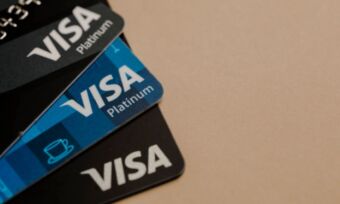Credit cards can be used for a variety of purposes – from making everyday purchases through to emergencies. Whatever the reason you have for deciding to get one, a credit card can be a useful tool as long as you manage it responsibly in order to avoid accumulating debt and high interest charges.
If you’ve decided to take out your first credit card, it’s important that you understand the basics. This could help you make the most of your credit card and avoid racking up debt. Here’s a rundown on how credit cards work, the application process and tips for choosing your first credit card.
How does a credit card work?
A credit card allows you to make payments in shops or online using money you are borrowing from the card provider. You are given a ‘line of credit’ and can access money up to your ‘credit limit’.
Credit limit
When you take out a credit card, your provider will tell you what credit limit you are eligible for. Your credit limit is the maximum amount of money you can borrow and it’s based on the information you provide in your credit card application. Providers will usually look at things like your employment history, income, assets, debts and expenses to make sure the credit limit is affordable and suits your circumstances.
You don’t have to accept the full amount offered and you can ask for a lower credit limit. A high credit limit can impact your borrowing power in the future. As a general rule, the higher your credit limit is, the lower the amount you can be lent.
If you go over your credit limit, you may not be allowed to continue using your credit card until you pay off your balance so it is under the limit. Some providers also charge a fee or extra interest.
Repaying your credit card
At the end of the month, your credit card provider will send you a statement showing the total amount you have borrowed, any fees or charges, the minimum repayment and the due date.
You’ll need to make the minimum repayment to avoid being charged a fee. But it is a good idea to pay off your balance in full by the due date if you can. Doing so will help you avoid being charged interest. That’s because most credit cards offer interest-free periods on purchases, such as up to 44 or 55 days.
What’s the best credit card for first timers?
If you’re applying for your first credit card, then it might be worthwhile considering a more basic card to start with. This could help make sure you are comfortable with managing credit before potentially moving on to a card with more features. A ‘basic’ card is one that comes with features like low or no annual fees, or low interest rates.
The reason for this is that credit cards with more features (such as rewards programs or access to travel related perks) tend to come with higher fees, and also potentially higher interest rates. If you find you’re having difficulty managing your repayments on your first credit card, then a more premium card could prove more costly.
How do I choose my first credit card?
There are different types of credit cards that you can choose from, including:
- Low rate credit cards offer low interest rates. There are also some credit cards that charge no interest, either for the life of the card or as an introductory offer.
- Low fee credit cards charge low or no annual fees. They usually offer fewer perks, such as rewards programs or complimentary insurance.
- Rewards credit cards offer a rewards program, such as the ability to earn reward points or cashback on your spending. They tend to charge higher annual fees and interest rates.
- Frequent flyer credit cards allow you to earn frequent flyer points on your spending, such as Qantas or Velocity points. They also usually have higher annual fees and interest rates.
As a first timer, you may want to look for a low rate and low fee credit card. This will keep your ongoing costs down. It may also suit you if you are unsure whether you would pay off your balance in full each month.
If you intend to use your credit card regularly and are confident that you will repay your balance off in full each month, you could consider a rewards or frequent flyer credit card. These cards usually charge higher annual fees, so it’s important to make sure the perks you get will offset this.
You can compare credit card options with Canstar. You can filter the results by credit card type and compare them based on interest rates, fees and more.
How do I apply for a credit card?
Usually, you can apply for a credit card online or at a branch. But make sure you meet all the eligibility criteria first. For example, you’ll generally need to be at least 18 years old, be an Australian citizen, resident or have an eligible visa, and meet any minimum income requirement.
You’ll also need to provide information about your employment, income, assets, debts and general living expenses. Having all this information on hand can help speed up your application process. It’s a good idea to check your credit score before you apply too. If you’re new to credit, you may have a limited credit history. If you have a low or poor credit score, there are increased risks with applying for credit to be aware of. You can check your credit score for free on the Canstar website or via the Canstar App.
If you’ve decided you do want to get a credit card, there are also factors that are important to keep your credit score on track, such as making regular on-time repayments.
What happens after you apply for a credit card?
Some credit card providers have ‘instant approval’, meaning you’ll get a response within 60 seconds of submitting your application. Approval is usually conditional on the provider verifying the information you have provided.
The provider will usually check your credit report, which will help them to work out whether to approve your application and how much to lend you. If the provider checks your report, it will be marked as a ‘credit enquiry’ and will stay on your report for five years.
For this reason, you may want to limit the number of credit card applications you make. Having lots of enquiries on your credit in a short space of time can be bad for your credit score as it may indicate you are in financial stress.
It generally takes between one to five days for credit card providers to process your online application. If you are approved, your credit card should generally arrive in the mail in five to seven business days. You’ll then need to activate your card to start using it.
What are some other options?
Think about whether you need a credit card in the first place. Credit cards can be beneficial if used responsibly, but it can also be easy to accumulate a lot of debt if you are not careful.
As an alternative, you could stick to a debit card. With a debit card, you are spending money that you already have in your transaction account. You won’t be charged interest and you can often avoid being charged ongoing fees. Another option is getting a prepaid card. With this type of card, you can pre-load funds onto it and you won’t be charged interest. Keep in mind that fees, terms and conditions can apply.
If you need help managing your debt, you can also get free financial counselling by calling the National Debt Helpline on 1800 007 007.









